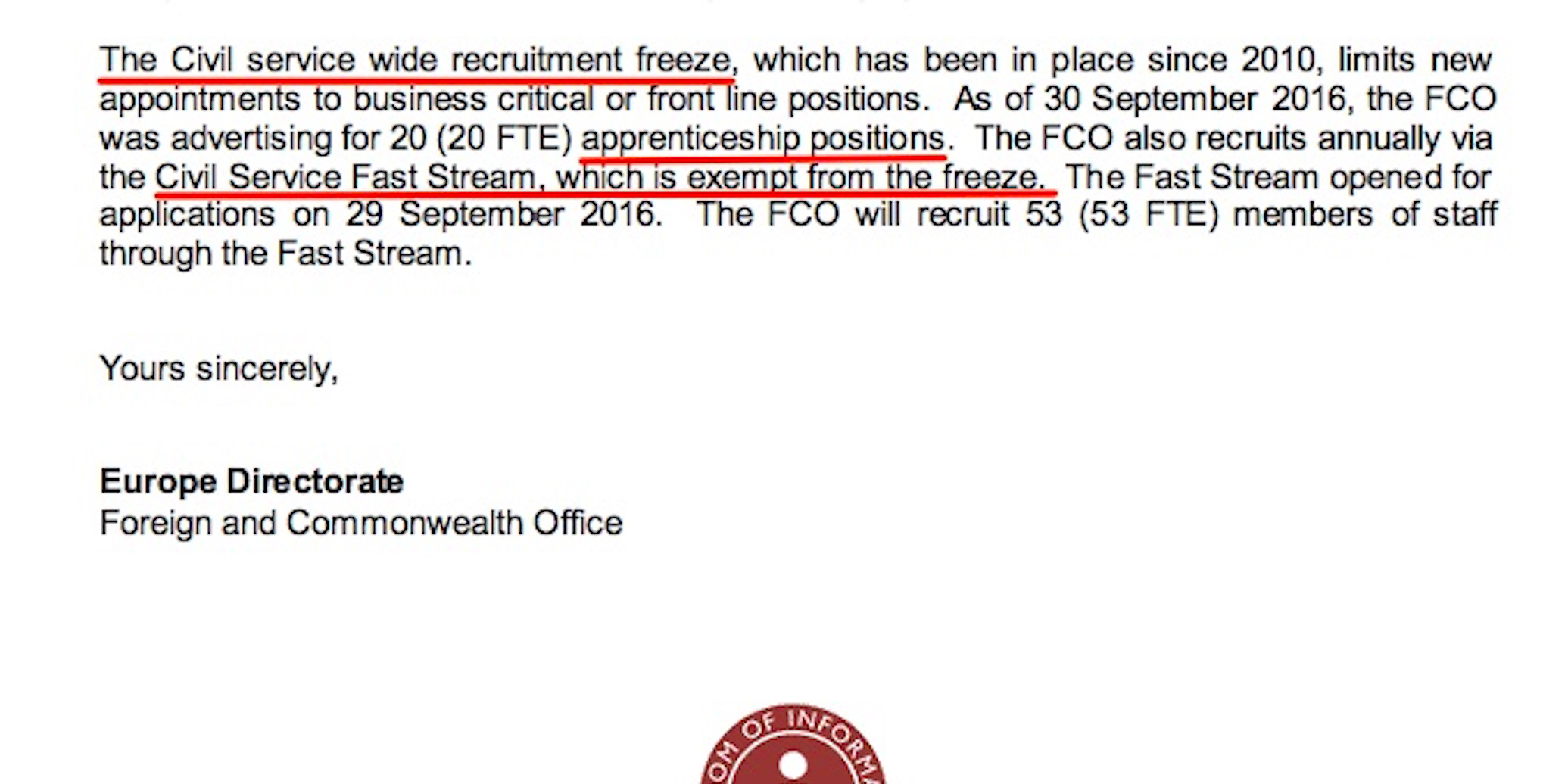- The Foreign Commonwealth Office helps the Department for Exiting the European Union (DExEU) and Department for International Trade (DIT) in formulating Brexit plans. There has been a hiring freeze on civil servants since 2010. The government can get around this by hiring apprentices and graduates through its fast track scheme. The former British ambassador to the EU, Ivan Rogers, previously said there was “serious multilateral negotiating experience is in short supply in Whitehall.“
LONDON – Some of the government’s most important departments related to the Brexit planning are being filled out with apprentices and graduates who go through the Civil Service Fast Stream.
That is according to a Freedom of Information Act request which was published on April 19.
On July 18 last year, the newly installed Prime Minister Theresa May announced:
1. The creation of the Department for Exiting the European Union (DExEU)
2. The creation of a Department for International Trade (DIT).
These two departments were “set up with the responsibility for overseeing negotiations to leave the EU, and establishing the future relationship between the UK and the EU; and promoting British international trade and investment,” said May at the time.
However, the Foreign Commonwealth Office only "seconded" (transferred) a total of 39 positions and 30 officials to DExEU. The government did not recruit any additional staff externally to replace them because the work has transferred to DExEU. To date, the government did not second any roles to DIT.

If you think about it - that is not a lot of staff to shepherd Britain into a new Brexit landscape. So, as the FOI says:
"As the department with overall responsibility for foreign policy and maintaining the UK's diplomatic and bilateral relationships across the globe; the FCO is working closely with these new departments to support the Government's priorities in securing the best possible outcome for the UK from negotiations."
However, the biggest issue on staffing is that there is a recruitment freeze on the civil service, that has been in place since 2010 and this, as the government says in the FOI, "limits new appointments to business critical or front line positions."
So, the government has got around this by advertising for 20 full-time apprenticeship positions at the FCO and will recruit 53 full-time members of staff through the Fast Stream - people with usually the least work experience on the jobs market.
However, as of 30 September 2016, the FCO has 4,389 UK-based staff, of which 4,305 are full-time. While these extra apprenticeships and graduates might not seem like much in proportion, it looks like the government will be counting on graduates and apprentices to bolster headcount growth because the FCO "recruits annually via the Civil Service Fast Stream, which is exempt from the freeze."
The government's ongoing issue with Brexit staffing

The government has encountered staffing issues over its Brexit department.
The FDA union, which represents those working in government, said in a statement that senior civil servants are unhappy because "the challenges of Brexit and existing Government priorities are pushing the service to its limits, while the SCS work more hours for falling real-terms pay."
Sir Ivan Rogers who unexpectedly quit as the British ambassador to the European Union on January 3 said that May does not have a concrete plan when it comes to Brexit.
Rogers' resignation letter contained thinly veiled attacks on the way the government is handling the Brexit process, including the allegation that "serious multilateral negotiating experience is in short supply in Whitehall."
He also called on former colleagues to challenge "muddled thinking" and "ill-founded arguments" during the Brexit talks.
Earlier this month, the Financial Times on Sunday reported that the government is offering private sector consultancy firms £1.5 million ($1.8 million) for six months' work as it seeks help dealing with the process of leaving the European Union, now that Britain has formally started the Brexit process.

